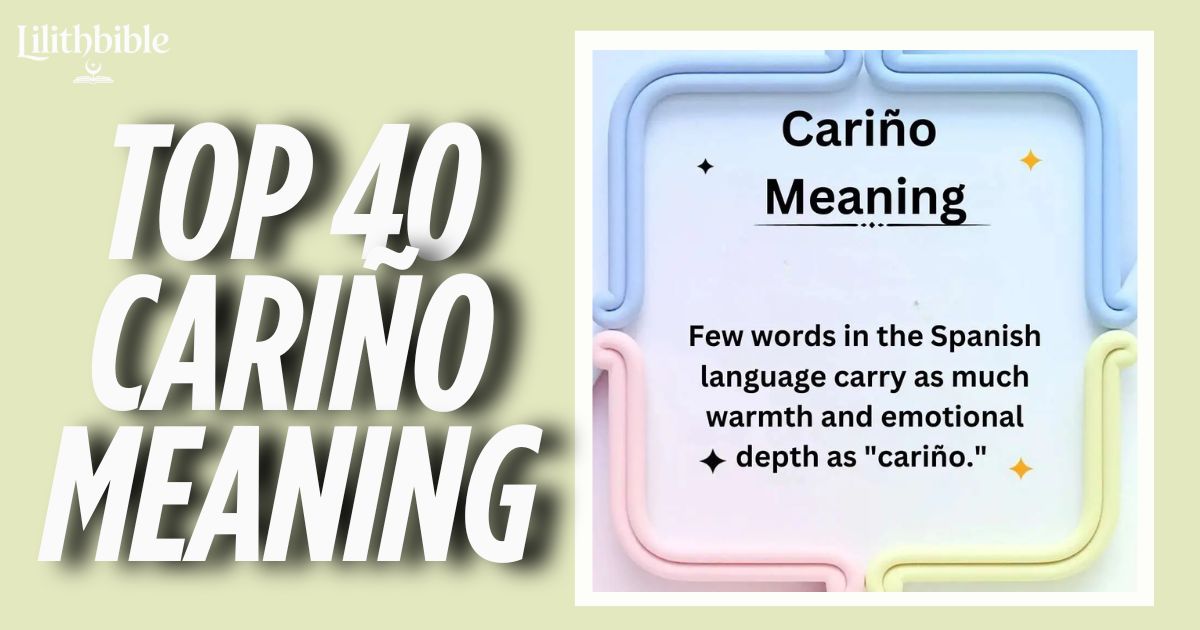Cariño Meaning is a beautiful Spanish word that expresses love, affection, and warmth. It is used in romantic relationships, friendships, and even family bonds. This word carries deep emotional value and is often heard in daily conversations across Spanish-speaking cultures. Whether you are in Spain, Mexico, or Colombia, you will hear Cariño Meaning used as a sweet and affectionate term.
Understanding Cariño Meaning helps you connect better with Spanish speakers. It is more than just a word it’s a way to show love and care. From couples to parents and friends, everyone uses it to express closeness. Learning how to use Cariño Meaning in the right context makes your Spanish sound more natural. If you want to express affection like a native, this word is a must-know. Keep reading to explore its definition, cultural significance, and how you can use it in everyday conversations.
Cariño Meaning and Definition
The Spanish word “cariño” refers to affection, love, fondness, or tenderness, often used to express warmth toward loved ones. It originates from the Latin word “carus,” meaning dear or beloved, and is commonly used in romantic relationships, family settings, and friendships. Beyond its literal meaning, “cariño” carries deep emotional significance in Spanish-speaking cultures, reflecting strong bonds and heartfelt connections.
Literal Meaning
The Spanish word “cariño” is deeply associated with affection, tenderness, and emotional warmth. While it is commonly translated as love or fondness, its true meaning varies based on context.
- Origin: Derived from the Latin “carus”, meaning dear or beloved.
- Used to express strong emotional connections toward people, animals, and treasured objects.
- Grammatical Note: “Cariño” is a masculine noun, always used with “el” (e.g., el cariño sincero – sincere affection).
Common English Translations
Although often translated as affection, “cariño” can have different meanings in English, depending on how it’s used.
| Spanish | English Equivalent |
| Cariño | Affection, love, tenderness |
| Mi cariño | My darling, sweetheart |
| Tener cariño a alguien | To have affection for someone |
| Con mucho cariño | With much love |
| Cariño mío | My love, my dear |
How Cariño Is Used in Spanish-Speaking Cultures
In Spain, Latin America, and other Spanish-speaking regions, “cariño” plays a crucial role in daily communication. It can be heard in romantic conversations, family interactions, and casual settings.
Romantic Relationships
- Couples frequently use “cariño” as a term of endearment:
- Example: “Buenas noches, cariño.” (Good night, sweetheart.)
- It can replace a partner’s name to create a more intimate and romantic tone.
- Frequently used in love letters, songs, and telenovelas to emphasize deep emotional bonds.
Family and Close Friends
- Parents use “cariño” as a loving nickname for their children:
- Example: “Mi cariño, ¿cómo te sientes hoy?” (My dear, how are you feeling today?)
- Friends use it to show appreciation and emotional connection:
- Example: “Siempre recordaré tu cariño.” (I will always remember your kindness and love.)
- Also used when comforting someone or expressing warmth and encouragement.
Casual and Friendly Interactions
- In Spain, it is common for shopkeepers, waiters, and colleagues to use “cariño” as a friendly gesture:
- Example: “Aquí tienes tu café, cariño.” (Here’s your coffee, dear.)
- Functions similarly to “sweetie” or “honey” in English-speaking cultures.
Cultural Significance and Usage in Media
- The word “cariño” is often found in Spanish-language songs, movies, and literature, reinforcing its deep cultural impact.
- Featured in romantic expressions, family affection terms, and casual Spanish phrases.
- Used in telenovelas and Disney movies, such as Encanto, where warm expressions of love and tenderness are central themes.
From romantic relationships to family love, “cariño” is a powerful word that reflects the rich emotional connections in Spanish-speaking cultures.
Cariño: Meaning and Definition
The Spanish word “cariño” refers to affection, love, fondness, or tenderness, often used to express warmth toward loved ones. It originates from the Latin word “carus,” meaning dear or beloved, and is commonly used in romantic relationships, family settings, and friendships. Beyond its literal meaning, “cariño” carries deep emotional significance in Spanish-speaking cultures, reflecting strong bonds and heartfelt connections.
Literal Meaning
The Spanish word “cariño” is deeply connected to affection, tenderness, and warmth. While it is often translated as love or fondness, its meaning extends far beyond a single definition.
- Etymology: It originates from the Latin word “carus”, meaning dear or beloved.
- Used to express emotional closeness toward people, pets, and cherished objects.
- Grammar Note: “Cariño” is a masculine noun, always preceded by “el” (e.g., el cariño verdadero – true affection).
Common English Translations
Though “cariño” is commonly translated as affection, it takes on various meanings depending on context.
| Spanish | English Equivalent |
|---|---|
| Cariño | Affection, love, fondness |
| Mi cariño | My darling, sweetheart |
| Tener cariño a alguien | To have affection for someone |
| Con mucho cariño | With much love |
| Cariño mío | My love, my dear |
How Cariño Is Used in Spanish-Speaking Cultures
In Spain, Latin America, and other Spanish-speaking communities, “cariño” is an important part of daily communication, used in romantic relationships, family interactions, and even casual conversations.
Romantic Relationships
- Couples use “cariño” as a term of endearment, similar to “darling” or “sweetheart” in English.
- Example: “Te amo, cariño.” (I love you, darling.)
- It often replaces a partner’s name in moments of affection.
- Frequently appears in Spanish love songs, romantic movies, and telenovelas, reinforcing its significance in romantic expressions.
- Some variations include:
- “Mi cariño” (My sweetheart)
- “Cariño mío” (My love)
Family and Close Friends
- Parents affectionately call their children “cariño” to express warmth and love.
- Example: “Ven aquí, mi cariño.” (Come here, my dear.)
- Friends use it to show appreciation and emotional connection.
- Example: “Siempre recordaré tu cariño.” (I will always remember your kindness and affection.)
- Also used in expressions of support and encouragement:
- “Gracias por tu cariño y apoyo.” (Thank you for your love and support.)
Casual and Friendly Interactions
- In Spain, it is common for store clerks, waiters, and coworkers to use “cariño” as a friendly term.
- Example: “Aquí tienes tu pedido, cariño.” (Here’s your order, dear.)
- Similar to how “sweetie” or “honey” is used in English-speaking cultures.
- Adds a warm, welcoming tone to conversations, even in non-romantic settings.
Cultural Significance and Usage in Media
- The word “cariño” frequently appears in Spanish-language music, movies, and literature, highlighting its cultural depth.
- Seen in telenovelas, Disney’s Encanto, and everyday Spanish phrases that emphasize love and affection.
- Used across different Spanish-speaking regions, with regional variations in tone and meaning.
From romantic love to family affection, “cariño” remains a fundamental part of Spanish-speaking cultures, reflecting deep emotional connections and warmth in everyday life.
Variations and Synonyms
The word “cariño” has several variations and synonyms, each with slight differences in meaning and usage. Depending on context, tone, and region, different words may be used to express affection, tenderness, or love.
Variations of Cariño
- Cariñito – A diminutive form of cariño, used to express extra warmth and endearment.
- Example: “Te tengo un cariñito especial.” (I have a special affection for you.)
- Con cariño – A phrase meaning “with affection” or “with love”, often used in letters, dedications, or kind gestures.
- Example: “Te envío este regalo con mucho cariño.” (I send you this gift with much affection.)
- Cariño mío – A poetic or romantic way of saying “my love” or “my dear”.
- Example: “Eres mi cariño mío.” (You are my dear love.)
- Sin cariño – Used to express the lack of affection or warmth in a situation.
- Example: “Me habló sin cariño.” (He/She spoke to me without affection.)
Synonyms of Cariño
While “cariño” is widely used, there are several synonyms that carry similar meanings, depending on the level of affection and relationship.
| Spanish Word | English Equivalent | Usage Context |
| Amor | Love | Used in romantic and deep emotional connections |
| Afecto | Affection | General warmth and friendly affection |
| Ternura | Tenderness | Expresses gentle and sweet emotions |
| Encanto | Charm, Delight | Used to describe admiration or endearment |
| Estimación | Esteem, Regard | More formal, used in respectful affection |
| Devoción | Devotion | Stronger emotional connection, often for religion or deep love |
Variations and Synonyms of Cariño
While “cariño” is commonly used, several other words convey similar meanings, depending on context and relationship dynamics. Here’s a comparison:
| Word | Meaning | Context |
| Amor | Love | More intense, used in deep romantic/familial relationships |
| Ternura | Tenderness | Describes a soft, loving, and gentle feeling |
| Afecto | Affection | More general, used in friendships and close relationships |
| Encanto | Charm | Often used as a compliment or term of admiration |
Key Differences
- “Cariño” is softer than “amor” but warmer than “afecto”.
- It conveys a close emotional bond without necessarily implying deep love.
- “Ternura” emphasizes a gentle and tender emotional connection.
- “Encanto” is often used to highlight someone’s charm or likability rather than emotional attachment.
Regional Differences in Meaning
Although “cariño” is widely understood across Spanish-speaking countries, certain cultural nuances affect its usage:
| Country | Unique Usage |
| Spain | Often used casually by waiters, shopkeepers, and friends |
| Mexico | Commonly used in romantic relationships and family settings |
| Argentina | Frequently used among close friends as a sign of warmth |
| Colombia | Frequently used by parents when addressing their children |
Regional Differences in Meaning
While “cariño” is widely understood in Spanish-speaking cultures, its usage varies slightly depending on region and context.
| Country | Unique Usage |
| Spain | Used casually in shops, restaurants, and workplaces as a friendly term |
| Mexico | Commonly expressed in romantic relationships and affectionate family interactions |
| Argentina | Frequently used among close friends to express warmth and familiarity |
| Colombia | Often used by parents towards children as a loving expression |
| Cuba | Can be heard in both romantic and platonic contexts, sometimes in an exaggerated manner |
| Venezuela | Frequently used in terms of endearment between couples and family members |
How to Use Cariño in Sentences
The word “cariño” can be used in different contexts, including romantic relationships, family interactions, and casual conversations. Here are some common ways to use it in sentences:
Romantic Context
In romantic relationships, “cariño” is often used as a term of endearment between partners.
- “Te amo, cariño.” (I love you, darling.)
- “Eres mi cariño más grande.” (You are my greatest love.)
- “Ven aquí, cariño, quiero abrazarte.” (Come here, darling, I want to hug you.)
Friendly or Family Context
Parents, siblings, and close friends also use “cariño” to express affection and warmth.
- “Mi hijo, siempre tendrás mi cariño.” (My son, you will always have my affection.)
- “Gracias por tu cariño y apoyo.” (Thank you for your affection and support.)
- “Mi abuela siempre me da mucho cariño.” (My grandmother always gives me a lot of love and affection.)
Casual Use
In some Spanish-speaking countries, “cariño” is used in casual conversations to express kindness or friendliness, even among acquaintances or customers.
- “¿Qué necesitas, cariño?” (What do you need, dear?) – Often used by shopkeepers or waiters in Spain.
- “¡Hola, cariño! ¿Cómo estás?” (Hi, dear! How are you?) – Common in informal greetings.
- “No te preocupes, cariño, todo estará bien.” (Don’t worry, sweetheart, everything will be fine.) – Used to reassure someone.
English Equivalents and Cultural Differences
While “cariño” does not have a direct one-to-one translation in English, several words convey a similar meaning depending on context:
| Spanish | English Equivalent | Usage |
| Cariño | Affection, love, fondness | General term for expressing warmth and care |
| Mi cariño | My love, sweetheart, darling | Used as a romantic endearment |
| Con cariño | With love, with care | Expresses kindness or warmth in a message |
| Sentir cariño por alguien | To feel affection for someone | Used to express deep fondness |
Cultural Differences
The way “cariño” is used varies between Spanish-speaking cultures and English-speaking cultures:
1. Usage in Spanish-Speaking Cultures
- Common in daily interactions – Used between family, friends, and romantic partners.
- Casual and formal settings – Can be heard in restaurants, workplaces, and even among acquaintances (especially in Spain).
- Emotional depth – Expresses both platonic and romantic affection, making it versatile in speech.
2. Usage in English-Speaking Cultures
- More reserved in casual settings – Words like “sweetheart” or “honey” are used, but mostly in romantic or close relationships.
- Not commonly used in workplaces – Unlike Spain, where waiters or shopkeepers may use “cariño” casually, English equivalents like “dear” or “sweetie” are more common in informal settings.
- Less flexible in meaning – English terms like “affection” and “fondness” are more specific and are not always used as terms of endearment.
Cariño in Popular Media
The term “cariño” also appears frequently in movies, telenovelas, and TV shows, reflecting its deep cultural significance.
Famous Songs Featuring “Cariño”
The word “cariño” appears in many songs, often expressing love, affection, and deep emotions. One notable example is “Cariño” by The Marias, a romantic and dreamy song about longing and love. Another classic is “Con Todo Mi Cariño” by Juan Gabriel, which conveys deep affection and gratitude.
“Dame Tu Cariño” by Los Temerarios is a heartfelt ballad about love and devotion, while “Cariñito” by Los Hijos del Sol is a beloved Peruvian cumbia song that expresses tenderness and longing. These songs highlight how “cariño” is a central theme in Latin music, emphasizing emotional connections.
Movies & TV Shows Featuring “Cariño”
The term “cariño” is frequently used in movies, telenovelas, and TV shows, reflecting its deep cultural significance. In Disney’s Encanto, characters use “cariño” to express love and warmth in their Colombian family. The animated film Coco (2017) showcases Mexican culture, where affectionate terms like “cariño” are common in family interactions.
In Jane the Virgin, Spanish endearments like “cariño” appear often in romantic and family conversations. Telenovelas such as Teresa and La Usurpadora frequently use the word in dramatic love stories and emotional dialogues. These examples show how “cariño” plays a key role in storytelling, reinforcing themes of love, affection, and cultural identity in Spanish-speaking media.
FAQs
What does it mean to call someone cariño?
Calling someone cariño means you feel affection for them. It is a warm, loving word used for partners, family, or close friends in Spanish.
Is cariño for a girl?
Yes, cariño can be used for both girls and boys. It is a gender-neutral term of endearment expressing warmth, love, and affection in Spanish.
Can I call my boyfriend cariño?
Yes, you can call your boyfriend cariño to show love and affection. It is commonly used in romantic relationships as a sweet, caring nickname.
What does cariñito mean in slang?
Cariñito is a cute, affectionate form of cariño. It means “little love” or “sweetheart” and is often used to express extra warmth and tenderness.
Conclusion
Cariño Meaning is more than just a word. It represents love, affection, and tenderness in Spanish-speaking cultures. People use it in romantic relationships, family conversations, and friendships. The Cariño Meaning is warm and heartfelt, making it a common term of endearment. Whether in Spain, Latin America, or everyday conversations, it expresses deep emotional connections.
The Cariño Meaning appears in songs, movies, and daily life. It shows the beauty of the Spanish language and how people express love. Unlike English words like “affection” or “fondness”, it carries a stronger emotional bond. The Cariño Meaning makes language richer and relationships closer. No matter where you hear it, it always brings warmth and love.

Dayo Olu is the experienced admin of LilithBible, a blogging website. With 5 years of strong blogging and content management experience, Dayo supports the platform from Nigeria with great care and dedication.








